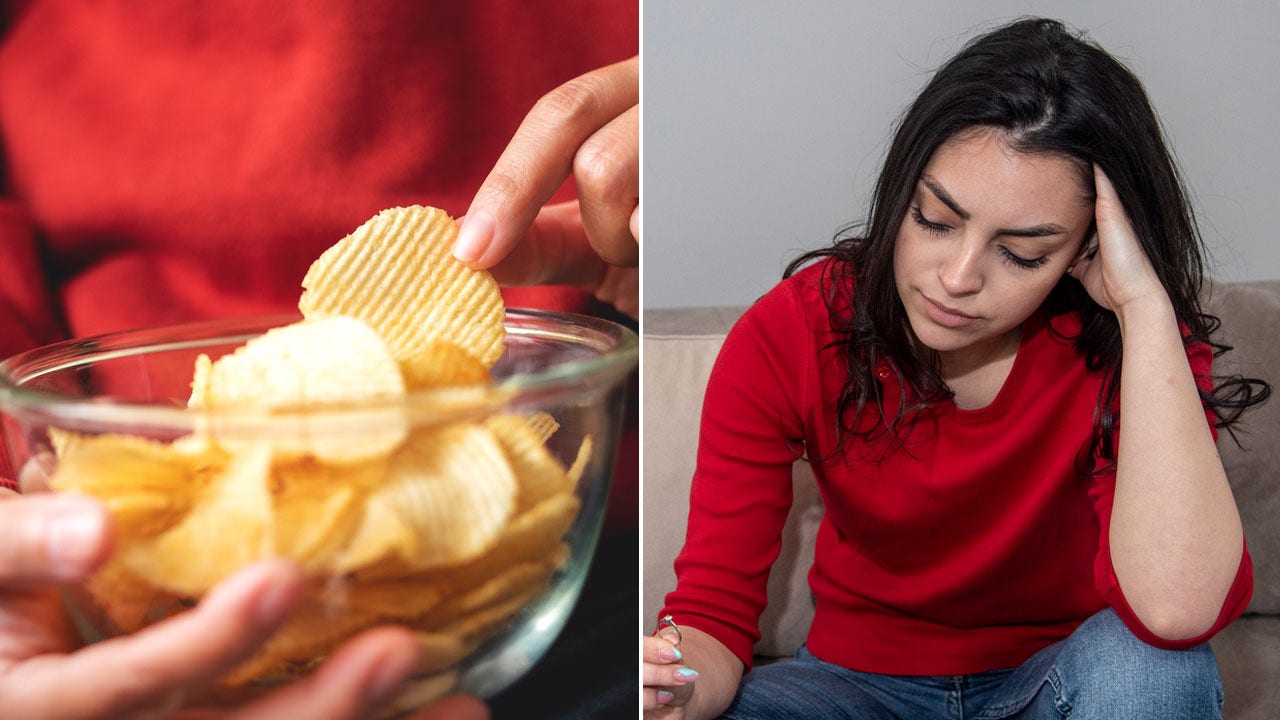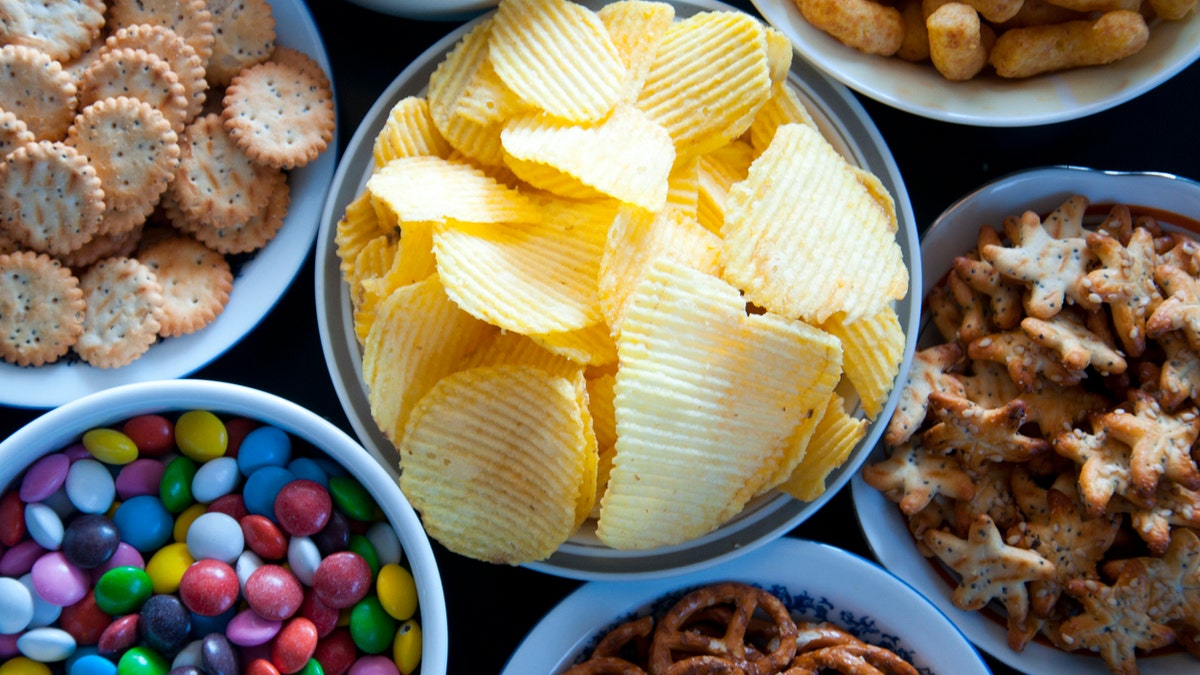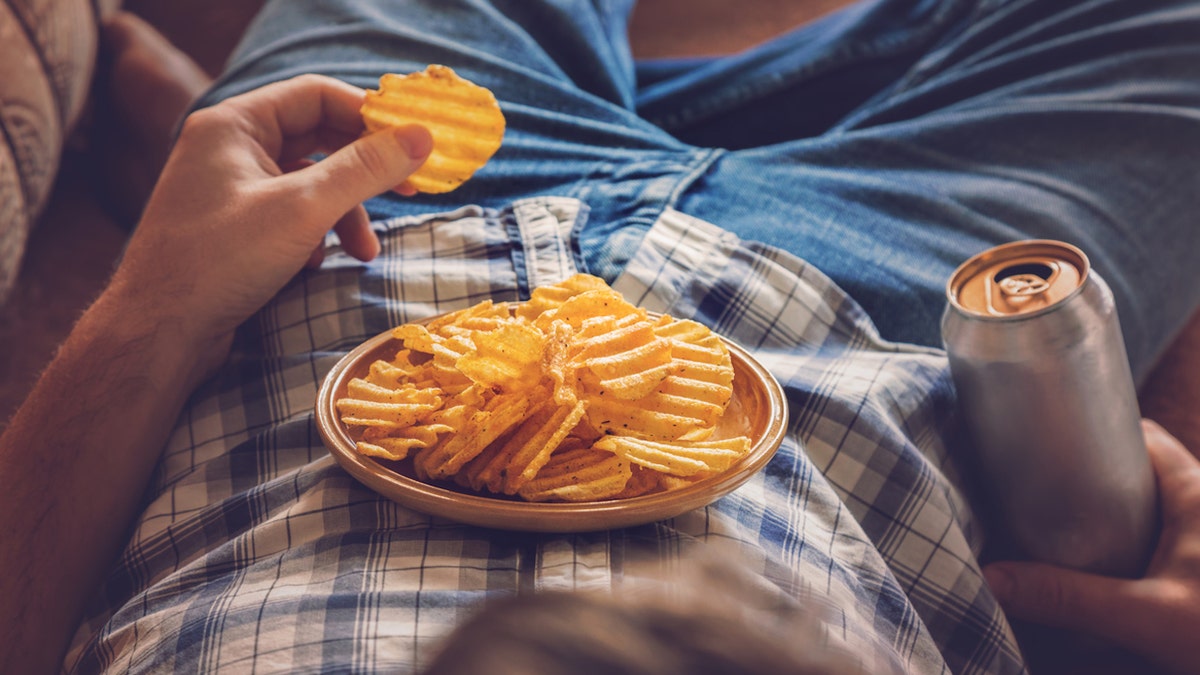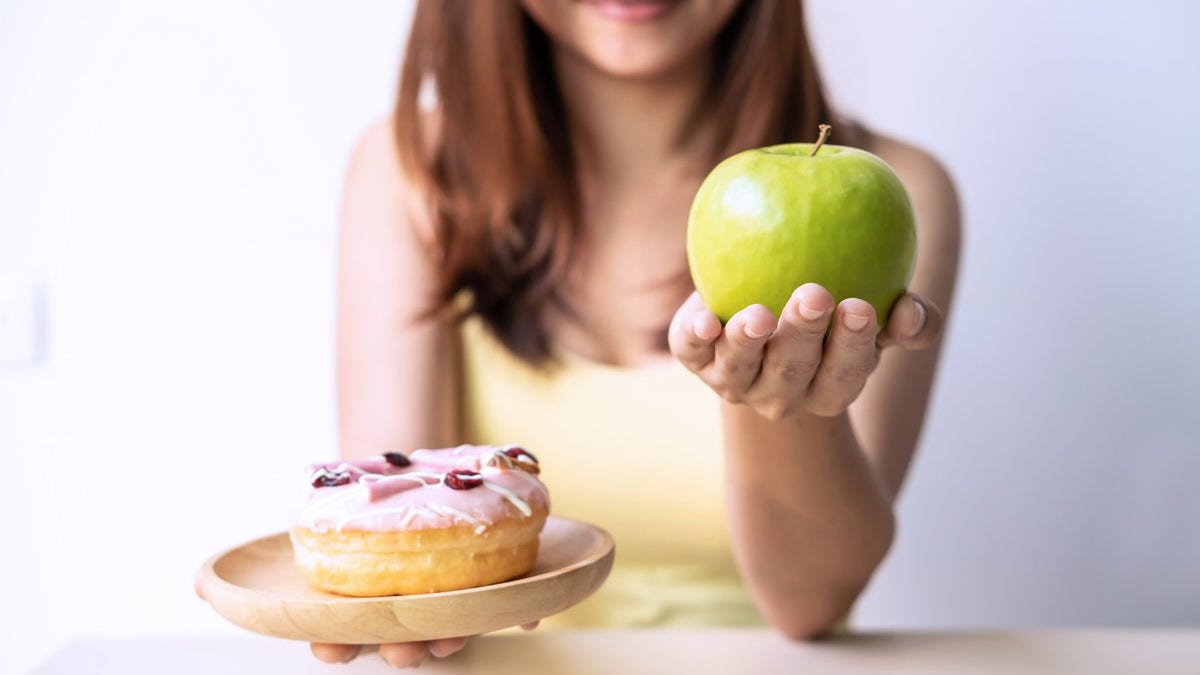Health
Depression risk spikes for those who eat these unhealthy foods, study finds: ‘Not a coincidence’

That bag of chips or slice of frozen pizza might make you happy while you’re eating it — but it could make you more susceptible to sadness long after the last bite.
A new study published in the journal JAMA Open Network found that eating “ultraprocessed” foods can contribute to a higher risk of depression.
Researchers from Brigham and Women’s Hospital and the Harvard T.H. Chan School of Public Health analyzed the dietary choices and mental health of more than 31,000 women between 42 and 62 years of age, according to the journal article.
ULTRAPROCESSED FOOD CONSUMPTION LINKED TO HIGHER RISK OF DEATH FROM OVARIAN, BREAST CANCERS: NEW STUDY
The data came from the Nurses’ Health Study II, conducted between 2003 and 2017.
All participants filled out a food questionnaire every four years, disclosing whether they consumed ultraprocessed foods (UPFs) or not.
A new study published in the journal JAMA Open Network found that eating “ultraprocessed” foods can contribute to a higher risk of depression. (iStock)
UPFs were grouped into nine categories: ultraprocessed grain foods, sweet snacks, ready-to-eat meals, fats and sauces, ultraprocessed dairy products, savory snacks, processed meat, beverages and artificial sweeteners.
“Ultraprocessed foods are those that include many preservatives, stabilizers, bulking or gelling agents, as well as artificial colors and flavors,” said Tanya Freirich, a registered dietitian nutritionist in Charlotte, North Carolina, who practices as The Lupus Dietitian. (She was not involved in the study.)
EATING HIGH-PROCESSED FOODS COULD LEAD TO A FASTER RATE OF COGNITIVE DECLINE: STUDY
“They are generally the types of foods that are shelf-stable for years to come,” she went on.
“Ultra-processed foods include things like chips, candies, frozen ‘TV dinners,’ chicken nuggets, sodas, sugar-filled breakfast cereals and packaged soups (the ‘just-add-hot-water’ type).”
“Our brain is just as vulnerable, if not more vulnerable than, other parts of our body to the negative effects of non-nutritive food additives.”
To gauge the participants’ mental health status, the researchers used two definitions: one, a strict definition requiring self-reported, clinician-diagnosed depression and regular antidepressant use; and two, a broad definition requiring clinical diagnosis and/or antidepressant use, as the journal article stated.

UPFs were grouped into nine categories: ultraprocessed grain foods, sweet snacks, ready-to-eat meals, fats and sauces, ultraprocessed dairy products, savory snacks, processed meat, beverages and artificial sweeteners. (iStock)
The researchers adjusted for other factors that could influence depression risk — such as age, body mass index, physical activity, smoking status, sleep health, chronic pain, alcohol consumption, income and any existing medical conditions.
After analyzing the results, the researchers found that people who ate higher amounts of ultraprocessed foods — in particular, artificial sweeteners and artificially sweetened beverages — were more prone to depression.
ASPARTAME COULD CAUSE MEMORY AND LEARNING DEFICITS IN FUTURE GENERATIONS, A NEW STUDY SUGGESTS
One possible reason is that artificial sweeteners cause chemical changes in the brain that can trigger the development of depression, they hypothesized.
“It is known that artificial sweeteners affect the brain through a different pathway than natural sweeteners like sugar or honey,” Frierich pointed out, noting that more research is needed in this area.
Those who had the highest intake of UPFs had a 34% to 49% increased risk of depression, the study found.

“Ultraprocessed foods include things like chips, candies, frozen ‘TV dinners,’ chicken nuggets, sodas, sugar-filled breakfast cereals and packaged soups.” (iStock)
Frierich said she was not surprised by the findings overall.
“Many studies have documented associations between some food additives and cancer, hormonal changes, weight gain and our mental health,” she told Fox News Digital.
“With that in mind, it is not surprising to me that there may be a link between ultraprocessed foods and depression.”
She also said, “Our brain is just as vulnerable, if not more vulnerable than, other parts of our body to the negative effects of non-nutritive food additives.”
The study’s limitations
While the study had a large sample size, high follow-up rate and advanced dietary assessment tools, it did have some limitations, the researchers pointed out.
The participants were primarily non-Hispanic White females.
Also, the study was observational — with no structured clinical interviews.
DEMENTIA-DEPRESSION CONNECTION: EARLY SADNESS CAN LEAD TO LATER COGNITIVE ISSUES, STUDY FINDS
“More diversity in the sample size may find differences among races and ethnicities in the association between UPF consumption and depression,” Frierich said.
“The high intake of UPFs was associated with greater BMI, high smoking rates, decreased likelihood of exercising regularly, as well as increased disease incidence of diabetes, HTN and dyslipidemia.”
Also, because this was an observational study and not a controlled one, it’s not a certainty that ultraprocessed foods were the determining factor in the depression, she noted.

“Depressed people may not have the energy to grocery shop, meal-prep their lunches or cook meals from scratch.” (iStock)
“A prospective study like this one only examines the association between the UPF and mental state,” Frierich said.
“Were people feeling more depressed and then turning to UPF as a form of comfort or convenience? Depressed people may not have the energy to grocery shop, meal-prep their lunches or cook meals from scratch.”
“Depressed people may not have the energy to grocery shop, meal-prep their lunches or cook meals from scratch.”
“While we cannot figure out what came first, the depression or the UPF, is it vital to note that when people reduced their intake of UPF, there was a consequential reduction in depression,” she added.
“The association is not a coincidence.”
7 HEALTHY LIFESTYLE CHANGES THAT COULD HELP REDUCE RISK OF DEPRESSION, SAYS STUDY: ‘ENORMOUS BENEFITS’
Lauren Harris-Pincus, a registered dietitian nutritionist who has been practicing for over 25 years in the New York/New Jersey area, told Fox News Digital that it’s important to take into account social determinants of health and access.
“Perhaps someone who eats most of their diet as UPF doesn’t have access to fresh foods in their neighborhood. Maybe they work several jobs and don’t have time to cook, or are caring for loved ones and sacrificing their own self-care,” said Harris-Pincus, who was not involved in the study.
Tips for improving diet for better mental health
When treating clients, Frierich recommends that they consider their diets as an important piece of the puzzle for mental health.
“Dietary changes do not need to be dramatic or expensive,” she said. “Start small by swapping out one processed snack for a piece of fruit, nuts, seeds or a raw vegetable. An apple, baby carrots or handful of nuts can be just as quick as a processed snack, but [this] reduces your intake of UPF by at least one serving.”
THESE 10 NUTRITION MISTAKES COULD BE TAKING YEARS OFF YOUR LIFE: HERE’S WHAT TO DO INSTEAD.
With small changes like these throughout the week, she said people may notice improvements in energy, digestion and other areas.
As artificial sweeteners were noted to be associated with depression, Frierich suggests choosing honey, sugar or agave nectar instead.
For beverages, she recommends opting for lightly sweetened or unsweetened tea, coffee or seltzer water instead of diet sodas.

“Ultimately, we want to strive for a diet rich in fruits, veggies, nuts, beans, seeds, whole grains and lean proteins,” Harris-Pincus said. (iStock)
Frierich also suggests using maple syrup, fruit juice-based popsicles and 100% fruit juice in place of sugar-free options.
“Artificial sweeteners can cause another problem — as we perceive them to be hundreds to thousands of times sweeter-tasting than natural sugars. If you use them often, you may have become accustomed to this ultra-sweet flavor,” she warned.
“Making the switch to natural sugars may taste less sweet at first, but your taste buds can and will adjust over time.”
CLICK HERE TO SIGN UP FOR OUR HEALTH NEWSLETTER
All types of sugar should be consumed in moderation, the dietitian added.
The World Health Organization recommends limiting added sugars to 25 grams or less (six teaspoons) per day for adults.
Added Friedrich, “Decreasing your intake of both artificially and naturally sweetened beverages and foods is a great idea for your physical and mental health.”

For beverages, opt for lightly sweetened or unsweetened tea, coffee or seltzer water instead of diet sodas, advised one dietitian nutritionist. (iStock)
Another important consideration is that not all UPFs are the same, Harris-Pincus said.
“When we message about limiting ultraprocessed foods, there is nuance — they are not all created equal.”
Simply peeling a vegetable, for example, is a form of processing, she noted — and while soy milk might be classified as an ultraprocessed food in a database, it is essentially a nutrient-dense whole food.
“Ultimately, we want to strive for a diet rich in fruits, veggies, nuts, beans, seeds, whole grains and lean proteins,” Harris-Pincus said.
“When we message about limiting ultraprocessed foods, there is nuance — they are not all created equal.”
“Some ultraprocessed food is OK, especially if combining processed foods and fresh foods makes it easier to get family meals on the table.”
For more Health articles, visit www.foxnews.com/health.

Health
'I'm a psychologist — here's how to finally break your bad habits’

More than a third of Americans report making New Year’s resolutions, statistics show, many of which are focused on kicking bad habits.
Whether it’s smoking, overeating, drinking excessive alcohol or “doom-scrolling” on social media instead of sleeping, 72% of U.S. adults report having at least one unhealthy behavior, according to data from the United Health Foundation.
Dr. Adi Jaffe, a California-based psychologist, knows firsthand the dangers of unhealthy habits, as he once struggled with drug addiction himself.
CDC WARNS OF DEADLY DRUG 100 TIMES MORE POTENT THAN FENTANYL, OVERDOSES SPIKE IN PAST YEAR
“I got trapped in the world of drugs and alcohol, from the middle of high school until a few years after college,” he shared with Fox News Digital during an on-camera interview.
Dr. Adi Jaffe, a California-based psychologist, struggled with drug addiction in his youth and now helps others overcome unhealthy habits. (Adi Jaffe, PhD)
“Addiction doesn’t separate by gender or age or race or income — people from all walks of life are impacted.”
Jaffe ultimately spent time in jail before getting clean and returning to school, earning two master’s degrees and a PhD in psychology.
“I wanted to understand what happened to me — and then what I’ve done over the last 15 years, hopefully, is bring those lessons to others who are struggling.”
“Addiction doesn’t separate by gender or age or race or income — people of all walks of life are impacted.”
Today, Jaffe focuses on helping people beat addiction and improve their mental health. In his upcoming book — “Unhooked: Free Yourself from Addiction Forever” — he shares a step-by-step program to help people free themselves from harmful habits.
Jaffe shared with Fox News Digital some of his tips and insights.
Recognizing the behavior
While many people think of addiction as involving drugs or alcohol, Jaffe noted that it can take many forms.

Many people assume that the behavior itself is the problem, the psychologist said — but there is almost always an underlying reason for those unhealthy or harmful choices. (iStock)
“If you engage in a behavior of any sort over long periods of time that robs you of your ability to be fully present in your life — and it bothers you, but you can’t find yourself stopping it, even though you’ve tried over and over — to me, that qualifies,” he said.
In addiction to substance abuse, addictive behaviors might include “doom-scrolling” on your phone for hours a day, binge-eating, gambling or indulging in other unhealthy activities.
SEVERE HEALTH RISKS OF VAPING AND E-CIGARETTES, ESPECIALLY FOR YOUTH, SAY EXPERTS
People can be addicted to work and success, too, Jaffe noted.
“When things get hard and get tough, they want to go to work,” he said. “They believe success or performance will make them feel better, but it can cause damage just like other addictions.”

“Doom-scrolling” on social media is a potentially addictive behavior, the psychologist noted. (iStock)
Social media is another form of addiction, the expert said.
“When your phone buzzes or pings, you don’t know what’s there, so it’s a novelty that’s interesting, and it releases dopamine,” he said. “You almost literally cannot help yourself.”
Identifying the ‘hooks’
Many people assume that the behavior itself is the problem, Jaffe said — but there is almost always an underlying reason for those unhealthy or harmful choices.
“The behavior was actually a medicine of sorts for a problematic undercurrent.”
“The reason you do it is that at some point earlier in your life, there was pain or struggle or emotional discomfort,” he said.
“And you discovered that when you engaged in the behavior, that discomfort went away. So the behavior was actually a medicine of sorts for a problematic undercurrent.”

More than a third of Americans report making New Year’s resolutions, statistics show, many of which are focused on kicking bad habits. (iStock)
For Jaffe, when he was 14 or 15 years old, his “hook” was social anxiety.
“And when somebody handed me a bottle of vodka at some sleepaway camp, I drank it because I didn’t want to look awkward,” he told Fox News Digital.
“Once I started drinking, I had no anxiety and felt like I belonged. I felt like I could talk to people. And so I realized that alcohol had ‘solved’ this problem.”

“Once I started drinking, I had no anxiety and felt like I belonged. I felt like I could talk to people. And so I realized that alcohol had ‘solved’ this problem.” (iStock)
Everyone has different hooks, Jaffe said, but there are similarities and patterns.
“We start living our lives trying to escape the discomfort of the hooks.”
Replacing the habit
Once people have identified an unhealthy behavior, one of the biggest mistakes they make is just trying to stop it without a plan, according to Jaffe.
CLICK HERE TO SIGN UP FOR OUR HEALTH NEWSLETTER
“We try to stop ourselves from doing what we don’t like,” he noted. “Especially around New Year’s, people might say, ‘I’m going to stop eating bad foods or I’m going to stop being lazy,’” he said.
Research has shown, however, that the most important aspect of kicking a bad habit is to replace the negative behavior with a positive one, the psychologist noted.

The most important aspect of kicking a bad habit is to replace the negative behavior with a positive one. (iStock)
“We have to stop trying to just eliminate bad habits — it doesn’t work,” Jaffe said. “We have to replace them with something else.”
For example, if someone wants to quit smoking, they might keep gum or sunflower seeds in their pocket, he said.
“You just have to keep going.”
Or, if someone is too focused on work, that might mean letting go of some tasks and delegating them to other people.
Jaffe also emphasized that the process of kicking a bad habit isn’t always perfect or seamless, and that slipping up from time to time doesn’t equate to failure.
For more Health articles, visit www.foxnews.com/health
“It’s okay to fall flat on your face a number of times while you’re working on changing this,” he said.
“You just have to keep going.”
Jaffe’s book, “Unhooked: Free Yourself from Addiction Forever,” will be available on Jan. 7.
Health
Warding off dementia means more reading, praying and listening to music: study

For long-term brain health, older adults might want to carefully consider how they spend their downtime, according to a new study.
Researchers from the University of South Australia assessed the 24-hour activity patterns of nearly 400 people over age 60.
When it comes to brain health, the study found that the context or type of activity individuals engage in matters, news agency SWNS reported.
DEMENTIA REPORT REVEALS ‘SHOCKING’ SIGNS AT AGE 60 THAT YOU’LL DEVELOP THE DISEASE BY AGE 80
Some sedentary behaviors are better for cognitive function than others, according to the findings, which were published in The Journal of Gerontology Series A.
Mentally stimulating behaviors, such as reading, listening to music, praying, crafting and playing a musical instrument — as well as social behaviors like chatting with others — are beneficial for memory and thinking abilities, the study noted.
Mentally stimulating behaviors such as reading, listening to music, praying, crafting and playing a musical instrument are beneficial for memory and thinking abilities, a new study noted. (iStock)
The research team referred to the “valuable insights” that could help reduce instances of cognitive impairment. More passive activities, like playing video games or watching TV, do not offer the same benefits as reading, praying and other activities, they noted.
More than 55 million people around the globe have dementia, according to estimates from the World Health Organization. Another 10 million new cases are diagnosed each year.
SLEEPY DURING THE DAY? IT COULD BE AN EARLY WARNING SIGN OF DEMENTIA, STUDY SUGGESTS
Dr. Maddison Mellow, researcher at the University of South Australia, said that not all sedentary behaviors are equal when it comes to memory and cognitive health.

“The context of an activity alters how it relates to cognitive function, with different activities providing varying levels of cognitive stimulation and social engagement.” (iStock)
“In this research,” she said, “we found that the context of an activity alters how it relates to cognitive function, with different activities providing varying levels of cognitive stimulation and social engagement.”
DEMENTIA RISK COULD BE LINKED TO WALKING SPEED, STUDY SUGGESTS
She said that scientists “already know that physical activity is a strong protector against dementia risk, and this should be prioritized if you’re trying to improve your brain health,” as SWNS reported.
“Even small, 5-minute time swaps can help.”
“But until now, we hadn’t directly explored whether we can benefit our brain health by swapping one sedentary activity for another.”
ALZHEIMER’S PATIENT, 90, SAYS SKIING AND OTHER ACTIVITIES KEEP HIM MENTALLY SHARP
She went on, “And while the ‘move more, sit less’ message certainly holds true for cardiometabolic and brain health, our research shows that a more nuanced approach is needed when it comes to thinking about the link between sedentary behaviors and cognitive function.”
It’s wise to “prioritize movement that’s enjoyable and gets the heart rate up,” she also said.
And “even small, 5-minute time swaps can help.”

“A more nuanced approach is needed when it comes to thinking about the link between sedentary behaviors and cognitive function.” (iStock)
A recent study published by the RAND Corporation in California also identified several major predictors occurring around age 60 that could likely lead to cognitive impairment and dementia in individuals by age 80, as Fox News Digital previously reported.
CLICK HERE TO SIGN UP FOR OUR HEALTH NEWSLETTER
Researchers evaluated 181 potential risk factors, including demographics, socioeconomic status, lifestyle and health behaviors, health history, psycho-social factors and more.
For more Health articles, visit www.foxnews.com/health
The list of predictors, according to RAND, included “never exercising” and “low engagement in hobbies.”
The study results suggested that “maintaining good physical and mental health is beneficial not just to staying in shape, but also to staying sharp and delaying cognitive decline,” study co-author Peter Hudomiet, a RAND economist in California, told Fox News Digital.
Melissa Rudy of Fox News Digital contributed reporting.
Health
Babies born in 2025 will begin Gen Beta, a brand-new generation

Babies born in the year 2025 will begin the newest generation – Generation Beta.
Following Generation Alpha (2010 to 2024), Gen Beta will comprise a new group of kids born between 2025 and 2039.
The Australian research firm McCrindle predicted that Gen Beta will make up 16% of the world’s population by 2035, and many will live to see the 22nd century.
AMERICANS ARE HAVING FEWER BABIES AS BIRTH RATE HITS HISTORIC LOW, CDC REVEALS
The research and analysis group, led by demographer and futurist Mark McCrindle, wrote in an article that Gen Beta “represents a pivotal chapter in our evolving world.”
Gen Beta will make up 16% of the world’s population by 2035, Australian research firm McCrindle projected. (iStock)
“We named them Alpha and Beta to signify not just new generations, but the first generations that will be shaped by an entirely different world,” McCrindle stated.
Gen Beta will face a variety of fast-changing global factors, like evolving technology, societal challenges, sustainability and climate, experts say.
“The DNA of children doesn’t change, but the culture does – and it has a dramatic impact on how kids turn out.”
As Gen Beta will mostly be the children of younger millennials and older Gen Zers, their parents will prioritize “adaptability, equality and eco-consciousness in their parenting,” McCrindle predicted.
“This will result in Generation Beta being more globally minded, community-focused and collaborative than ever before,” the article reads. “Their upbringing will emphasize the importance of innovation not just for convenience, but for solving the pressing challenges of their time.”

Gen Beta will be the children of younger millennials and older Gen Zers. (iStock)
High-tech kids
As artificial intelligence grows in prevalence and access to technology continues to increase, Gen Beta’s digital and physical worlds will be “seamless,” according to analysts.
“Generation Beta will live in an era where AI and automation are fully embedded in everyday life — from education and workplaces to health care and entertainment,” McCrindle wrote.
LIMIT OF 3 HOURS OF WEEKLY SCREEN TIME FOR KIDS HAS ‘POSITIVE EFFECT’ ON BEHAVIOR, MENTAL HEALTH: STUDY
The research group predicted that Gen Beta will likely be the first generation to experience autonomous transportation “at scale,” as well as wearable health technologies and immersive virtual environments as “standard aspects of daily life.”

“Generation Beta will live in an era where AI and automation are fully embedded in everyday life,” McCrindle predicted. (iStock)
“Their formative years will be marked by a greater emphasis on personalization — AI algorithms will tailor their learning, shopping and social interactions in ways we can only begin to imagine today.”
As Gen Beta kids enter a world of “always-on technology,” digital interactions will be key to social connections, education and careers, the analysts noted.
U.S. SURGEON GENERAL ADVISORY NAMES PARENT STRESS AN ‘URGENT PUBLIC HEALTH ISSUE’
“We predict Generation Beta will embody the balance between hyper-connectivity and personal expression,” McCrindle said. “They’ll redefine what it means to belong, blending in-person relationships with global digital communities.”
Generational parenting
The fate of Gen Beta kids will largely hinge on their millennial and Gen Z parents, who welcome technology as a learning tool but are also wary of the risks of overexposure, according to experts.
“You can’t change the world, but you can change how you’re parenting.”
Educational psychologist and parenting expert Dr. Michele Borba noted that parents will need to pay attention to what Gen Beta needs to thrive.
PSYCHOLOGISTS REVEAL 7 WAYS PARENTS CAN DRIVE HAPPINESS BY HELPING KIDS FIND THEIR PURPOSE
“The DNA of children doesn’t change, but the culture does – and it has a dramatic impact on how kids turn out,” California-based Borba said in an interview with Fox News Digital.
“That said, you can’t change the world, but you can change how you’re parenting.”

Paying attention to what drives your child is crucial to their development and happiness, according to one psychologist. (iStock)
“The first step [for parents] is to recognize the changes that are happening … so they can make sure they’re raising a strong generation of kids who can handle a new world,” she added.
Gen Beta will be a “generation of digital natives,” born into a world where their chores, shopping and even homework can be done for them, according to the psychologist.
For more Health articles, visit www.foxnews.com/health
“Critical thinking, collaboration, creativity and communication – those will all be impacted by AI,” Borba predicted.

The psychologist encouraged parents to remain calm during uncertain times, since children will mirror their response. (iStock)
She suggested that parents teach their Gen Beta kids to be adaptable, as things like technology and job markets will see major changes in their lifetime.
Borba also encouraged parents to remain calm during uncertain times, as children will mirror that response.
CLICK HERE TO SIGN UP FOR OUR HEALTH NEWSLETTER
The psychologist also stressed the importance of children getting enough social interaction, especially if they don’t have siblings.
“What’s crucial to the well-being of our children is strong social relationships,” she said.
Social regression has already impacted the youngest generations, Borba warned, resulting in shorter attention spans and a fear of taking risks.

Parents should teach their kids social skills to balance a reliance on growing technology, a psychologist advised. (iStock)
For parents raising kids of an entirely new generation, she went on, it’s essential to pinpoint and nurture their strengths.
“Figure out who your kid is,” she advised. “From a very early age, figure out what drives them, not what you want them to become.”
Fox News Digital reached out to McCrindle requesting comment.
-
/cdn.vox-cdn.com/uploads/chorus_asset/file/25672934/Metaphor_Key_Art_Horizontal.png)
/cdn.vox-cdn.com/uploads/chorus_asset/file/25672934/Metaphor_Key_Art_Horizontal.png) Technology1 week ago
Technology1 week agoThere’s a reason Metaphor: ReFantanzio’s battle music sounds as cool as it does
-

 News1 week ago
News1 week agoFrance’s new premier selects Eric Lombard as finance minister
-

 Business1 week ago
Business1 week agoOn a quest for global domination, Chinese EV makers are upending Thailand's auto industry
-

 Health5 days ago
Health5 days agoNew Year life lessons from country star: 'Never forget where you came from'
-
/cdn.vox-cdn.com/uploads/chorus_asset/file/24982514/Quest_3_dock.jpg)
/cdn.vox-cdn.com/uploads/chorus_asset/file/24982514/Quest_3_dock.jpg) Technology5 days ago
Technology5 days agoMeta’s ‘software update issue’ has been breaking Quest headsets for weeks
-

 World1 week ago
World1 week agoPassenger plane crashes in Kazakhstan: Emergencies ministry
-

 Politics1 week ago
Politics1 week agoIt's official: Biden signs new law, designates bald eagle as 'national bird'
-

 Politics6 days ago
Politics6 days ago'Politics is bad for business.' Why Disney's Bob Iger is trying to avoid hot buttons















